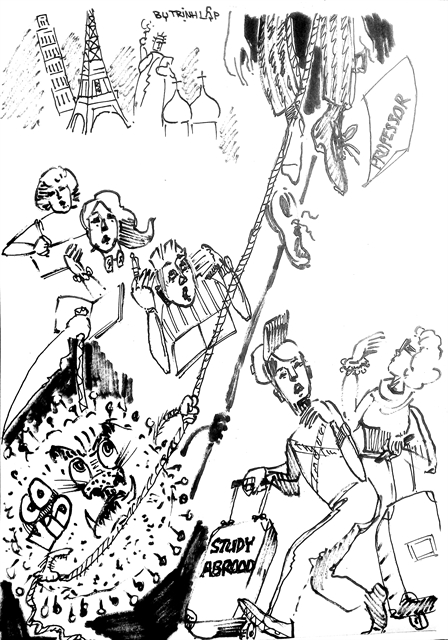 Talk Around Town
Talk Around Town

Vietnamese families have maintained an age-old tradition of scrimping on everything else except education.

|
| Illustration by Trịnh Lập |
by Nguyễn Mỹ Hà
It’s the talk of every summer, even this one: What school to choose for your children, be it pre-school or pre-college.
COVID-19 is almost certain to derail the best of plans, of course, but plans can be adjusted, shelved, delayed. Life can’t. Just last week, the prestigious City University of New York released an obituary paying its respects to nearly 50 staff who have died from the disease.
It’s an immense human toll. And if you look at the faculty of any university or college, losing so many people in such a short period of time is losing the institution’s backbone.
When you send your kids abroad to college, you’re giving them the opportunity to immerse themselves in a life of lectures and research as well as recreational pursuits and even on-campus jobs to make some extra bucks.
They also make friends, some that will last for a lifetime, or will be influenced by a professor who may become a mentor.
If you take into account the time it takes to educate someone through college and then on to post-grad and doctorate studies, the loss from these fatalities is not borne by the New York school alone.
Many Vietnamese students and especially their parents have had an added layer of stress to deal with in the last couple of weeks, with the US issuing a directive stating that overseas students cannot stay in the country if their course is changed to online classes only.
It was, thankfully, withdrawn, after Harvard and MIT fought back.
Harvard wrote on its website that, “This is a significant victory. The directive has disrupted all of America’s higher education sector.”
“These students - our students - can now rest easier and focus on their education, which is all they ever wanted to do. While the government may attempt to issue a new directive, our legal arguments remain strong and the court has retained jurisdiction, which will allow us to seek judicial relief immediately to protect our international students should the government again act unlawfully.”
That all sounds reassuring, and if you’re at Harvard or another Ivy League school then you’re clearly on pretty safe ground. But if not (and that’s most students), more consideration than ever is needed now when deciding where to spend your hard-earned savings on your child’s education.
Vietnamese families have maintained an age-old tradition of scrimping on everything else except education. They believe schooling can change a person’s life, no matter how disadvantaged his or her family or background.
The poorer the province you may call home, the greater your determination to escape from poverty. You tend to be more focused on your one and only means of lifting you out of your current situation -- education.
This tradition has been praised over the years, for it has bred many bright students and great minds that have inspired generations.
And during these days of pandemic and uncertainty, you can still study no matter where you find yourself. If you crave knowledge and education, it’s readily found online or offline or both and can be done with friends and mentors. Subjects needing one-to-one contact and mentorship, though, such as the performing arts, music, and lab work, require seeking out a teacher.
But even if you can learn on your own or online, taking part in group discussion or workshops and enjoying college life is what higher education is supposed to also be about.
Many parents brought their children home from pandemic-stricken countries such as the US, the UK and large parts of Europe. The Government of Việt Nam also sent 'rescue flights' to bring Vietnamese home. Home always feels safer, and in Việt Nam’s case it’s absolutely true at this point in time.
I was surprised to learn that a high school friend has decided to still send her son to college in the US this fall. He’s studying medicine, so can’t just learn online.
“Pandemics come and go, but if we don’t train the health workers of the future, who will take care of us later?” she asked, and after some hesitation I could see her point.
But as a parent, surely she is concerned about him going to a new country, a new environment, new circle of friends, and everything else that’s happening at the moment.
Which she is, of course. But she’s putting on a brave face, because she believes she has taught him enough about life that he knows when and where to find himself shelter no matter the situation.
So good luck to her and her family, and bon voyage to her son! The future is indeed in the hands of today’s youngsters. They need to have their own experience. You can’t keep them by your side forever, but you can teach them common sense that will get them through whatever tough times lay ahead. Even in another country. VNS




